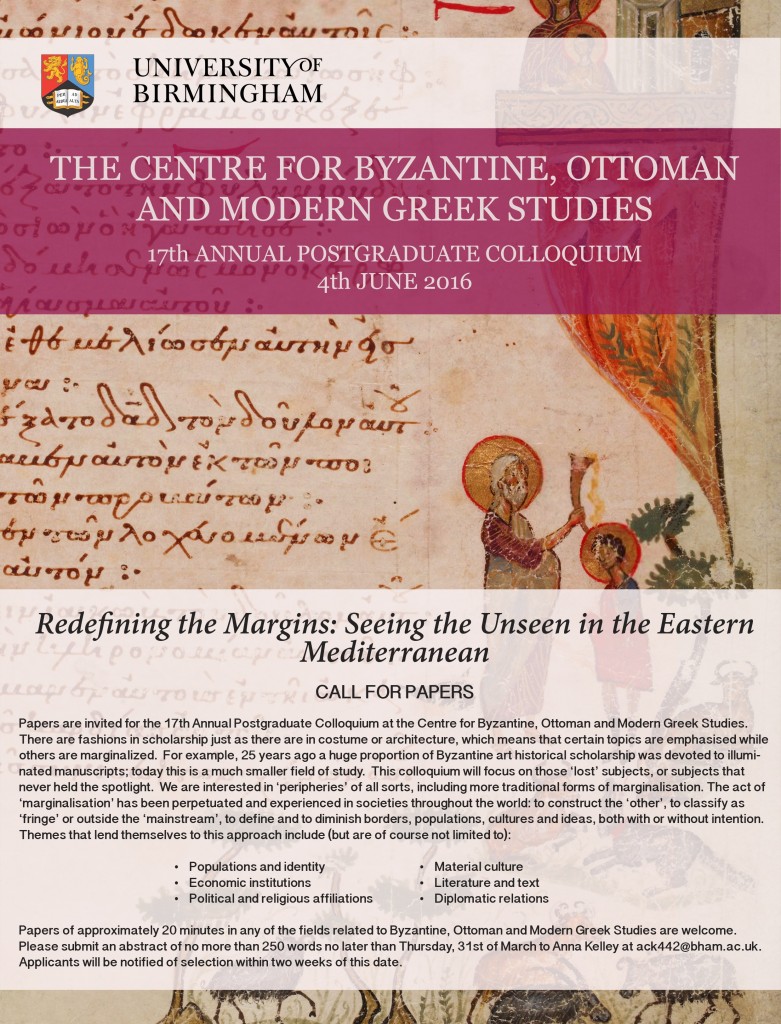Xème édition des Rencontres internationales des doctorants en études byzantines
6-7 octobre 2017
Maison de la Recherche
Programme
Vendredi 6 octobre 2017
9h Accueil
Session 1 : Religion, liturgie et politique
9h30 – Florin Filimon (Westfälische Wilhelms Universität Münster) – Inquiring God in the Decision-Making Narratives in Byzantium (6th-12th centuries)
10h – Marie-Emmanuelle Torres (Aix-Marseille Université) – Chanter pour le salut d’autrui. Une fonction utilitaire de la pratique musicale des monastères byzantins (IXe-XVe siècles)
10h30 – Mariam Nutsubidzé (Université Paris-Sorbonne) – Le Petit Nomocanon géorgien et l’adaptation de droit canonique byzantin
11h-11h30 – Pause Café
Session 2 : La Géorgie dans le monde byzantin
11h30 – Natalia Chitishvili (Apollon Kutateladze Tbilisi State Academy of Fine Arts) – King and Bishop in the Church: Liturgical Planning in Medieval Georgia
12h – Eka Kvirkvelia (Ivane Javakhishvili Tbilisi State University) – Athonic Text Type of Old Georgian Translation of the Gospels
12h30 – Okropir Jikuri (Ivane Javakhishvili Tbilisi State University) – Several Issues of Similarities and Differences between the Georgian Liturgical Manuscript Gulani and Greek Manuscripts Pandektes and Oceanus
13h – Déjeuner
Après-midi : visite au musée du Louvre
Samedi 7 octobre 2017
9h30 Accueil
Session 3 : Échanges et communications
10h – Stepan Stepanenko (École Pratique des Hautes Études), Aleksandr Fetisov (State Museum of Orien-tal Art, Moscou) – « Varyangian to the Greeks » Trade Route in the 10th century
10h30 – Tülin Kaya (Middle East Technical University, Ankara, Princeton University) – Communications in Byzantine Asia: Change and Continuity
11h-11h30 – Pause Café
11h30 – Vesna Šćepanović, Argyri Dermitzaki, Sofia Zoitou (University of Fribourg) – From Venice to the Holy Land. The Making of New Holy Sites along the Sea Routes of the Eastern Mediterranean in the Late Middle Ages (1300-1550). Three Case Studies
12h – Benjamin Bourgeois (Université Paul-Valéry Montpellier 3) – Altérité et confins. Écriture et réécriture arménienne de la relation des princes roupéniens avec l’Empire byzantin. XIIe-XIIIe siècles
12h30-14h – Déjeuner
Session 4 : Origine et développement de schémas iconographiques
14h – Carine Alvarez (Université Paul-Valéry Montpellier 3) – La représentation de l’ennemi dans l’iconographie orientale des saints cavaliers sauroctones (IVe-XIIe siècles)
14h30 – Tatiana V. Oleynik (Kharkiv National University) – About One of the Iconographic Types of Images of Theotokos from Byzantine Cherson and Search of Its Possible Analogues
15h-15h30 – Pause Café
Session 5 : Archéologie et image des sciences
15h30 –Michèle Villetard (Université Lille 3) – Archéologie de la paideia du Ve au VIIe siècle : Alexandrie, Constantinople et Béryte
16h – Merih Danali Cantarella (Harvard University) – In Praise of Mathematical Astronomy: the Mechanical Cosmos, and New Pictorial Language of Knowledge in Fourteenth-century Byzantium
Session 6 : Byzance et les institutions ottomanes
16h30 – Mahir Polat (Istanbul University), Hacer Coskun (Ankara Yildirim Beyazit University) – Byzantine Cultural Heritage Repurposed by Faith Fatih Foundation
17h – Melpomeni Perdikopoulou (Aristotle University of Thessaloniki) – The Alaca Imaret of Thessaloniki and the Imaret Institution
Livret
Comité d’organisation
Jacques Beauseroy
Benoit Cantet
Aikaterini Peppa
Jack Roskilly
Milan Vukašinović
Lilyana Yordanova


